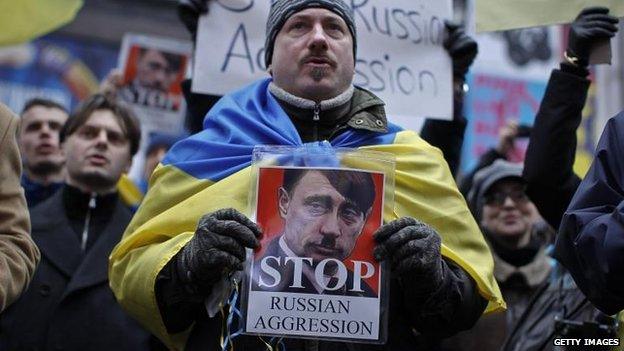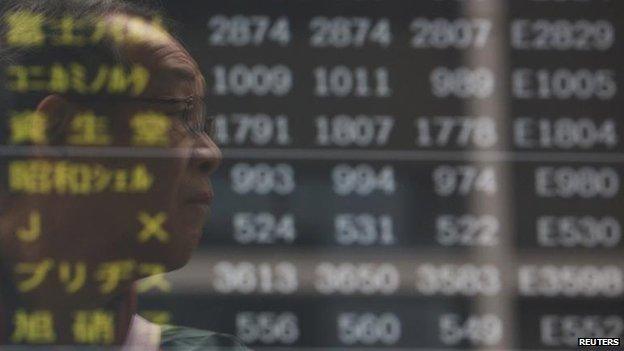Ukraine crisis: G7 condemns Russia military build-up
- Published
"It's clear by this stage Kiev has lost control of Crimea," reports Philippa Young
Russia's G8 partners have condemned Moscow's military build-up in Ukraine amid fresh diplomatic efforts to avert a dangerous escalation of the crisis.
The world's seven major industrialised powers also suspended preparations for the G8 summit in Sochi in June.
Meanwhile, European Union foreign ministers are due to meet in emergency session in Brussels.
The moves come as Russian military forces continue to strengthen their grip on the Crimean peninsula.
Ukraine's interim government has accused Russia of having declared war, and has ordered the mobilisation of its armed forces.
But Russian President Vladimir Putin has so far defied calls from the West to pull back his troops.
He insists Russia has a right to protect its interests and those of Russian-speakers in Crimea and elsewhere in Ukraine.
The UN said on Sunday that Deputy Secretary-General Jan Eliasson was travelling to Ukraine to be "personally apprised of the facts on the ground".
A statement said he would brief UN Secretary General Ban Ki-moon "on the next steps the United Nations could take to support the de-escalation of the situation".
On Monday morning, the MICEX index of stocks in Moscow suffered an initial fall of about 5% and the rouble fell 2.5% to an all-time low against the US dollar.
Russia's central bank also raised its main interest rate to 7% from 5.5%.
Financial backing
The G7 of Canada, France, Germany, Italy, Japan, the UK and the US urged Russia to hold talks with Ukraine to address any human rights or security concerns it had.
In a statement released from the White House, external, the grouping said it condemned "the Russian Federation's clear violation of the sovereignty and territorial integrity of Ukraine".
It added: "We have decided for the time being to suspend our participation in activities associated with the preparation of the scheduled G8 Summit in Sochi in June."
G7 finance ministers said they were ready "to provide strong financial backing to Ukraine".
"The International Monetary Fund (IMF) remains the institution best prepared to help Ukraine address its immediate economic challenges through policy advice and financing," a statement said.
Ukraine needs $35bn over the next two years, according to the finance ministry,
'Brink of disaster'


Protesters in New York demonstrated against the Russian action in Crimea

All eyes were on the major markets on Monday, as investors reacted to the Ukraine crisis
World leaders have been scrambling to find a diplomatic solution to the growing crisis.
On Sunday, Nato held an emergency meeting in Brussels.
UK Foreign Secretary William Hague has arrived in Kiev for talks with the new government and US Secretary of State John Kerry is to travel to Ukraine on Tuesday.
US President Barack Obama has called Russia's actions a breach of international law and a threat to peace and security.
Nato issued a statement saying it "condemns Russia's military escalation in Crimea". However, Ukraine is not a Nato member and the bloc is not obliged to come to its defence.
The US believes Russia has complete operational control of Crimea with more than 6,000 troops in the region.
Several Ukrainian army bases were surrounded by Russian troops earlier on Sunday.
In response, Ukraine has ordered a full military mobilisation.
The BBC's Sarah Rainsford in Kiev says men across Ukraine have been receiving call-up papers and will start reporting for 10 days training from Monday.
Interim Prime Minister Arseniy Yatsenyuk warned that the country was "on the brink of disaster".
On Sunday, the head of the Ukrainian navy, Denis Berezovsky, was removed from his post after he pledged allegiance to the new pro-Russian authorities in Crimea.
Ukraine's interim leaders have put him under investigation for treason.
Moscow has not recognised the government that took power in Kiev last month after ousting the elected pro-Russian President, Viktor Yanukovych.
Mr Yanukovych's decision in November to abandon closer ties with the EU in favour of Russia sparked massive protests in Kiev, which ended in a bloodbath, as dozens of protesters were shot dead in clashes with police.